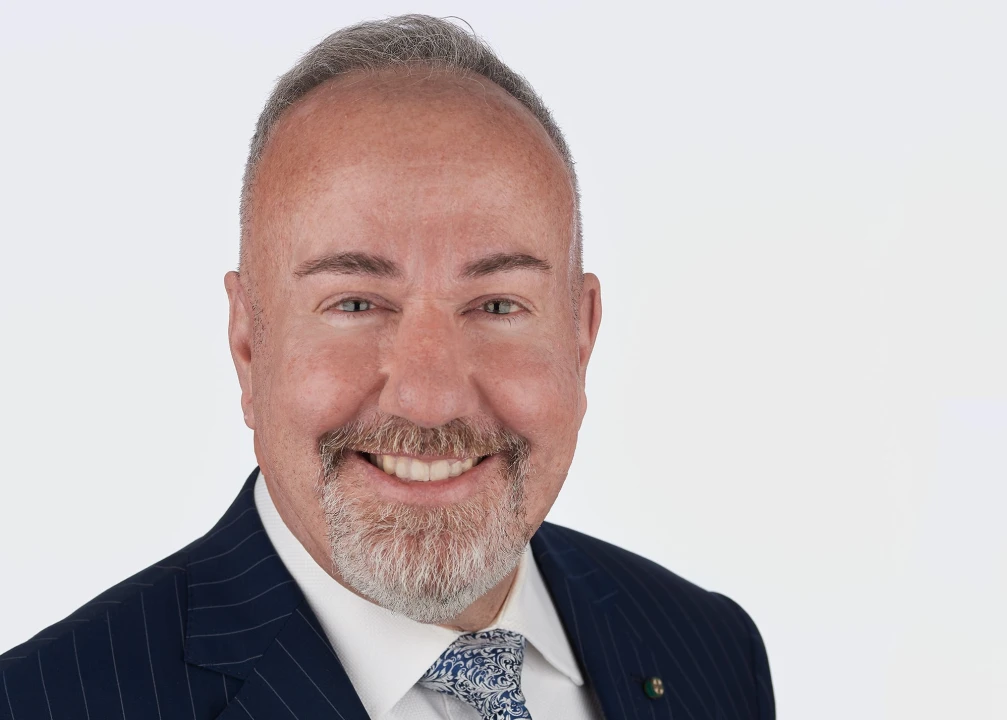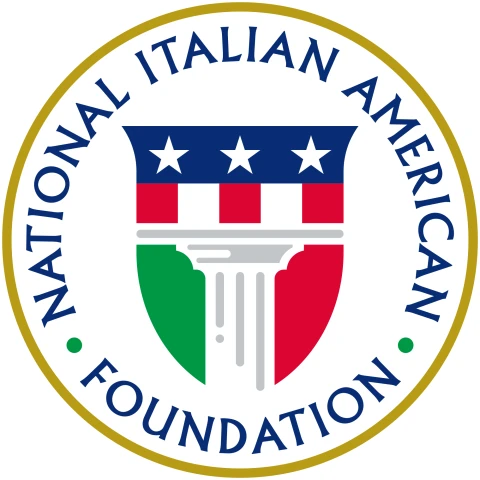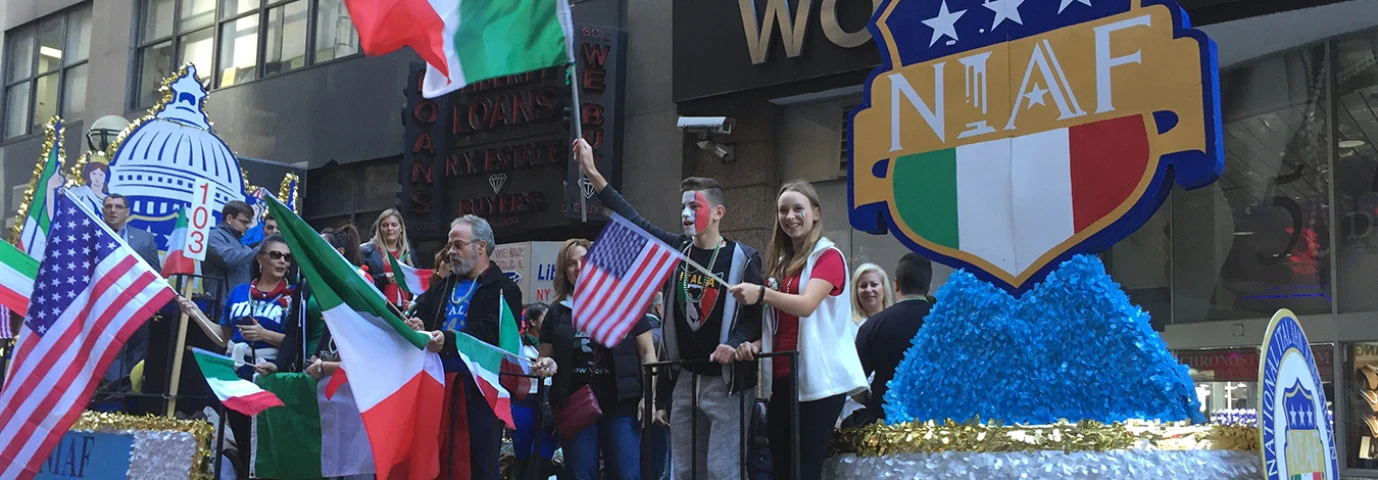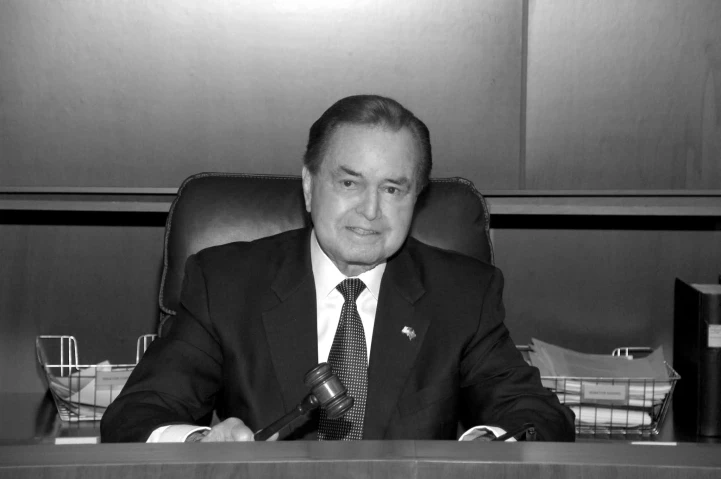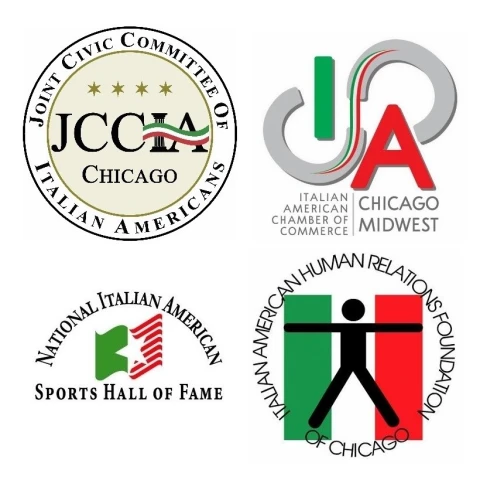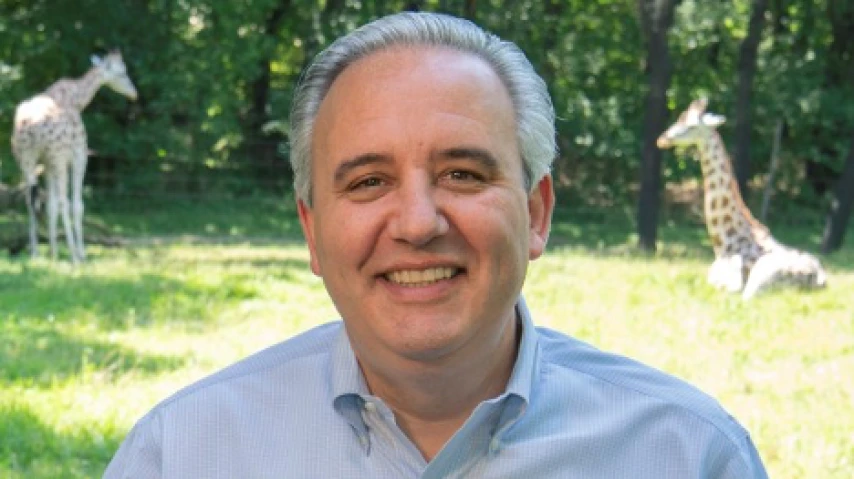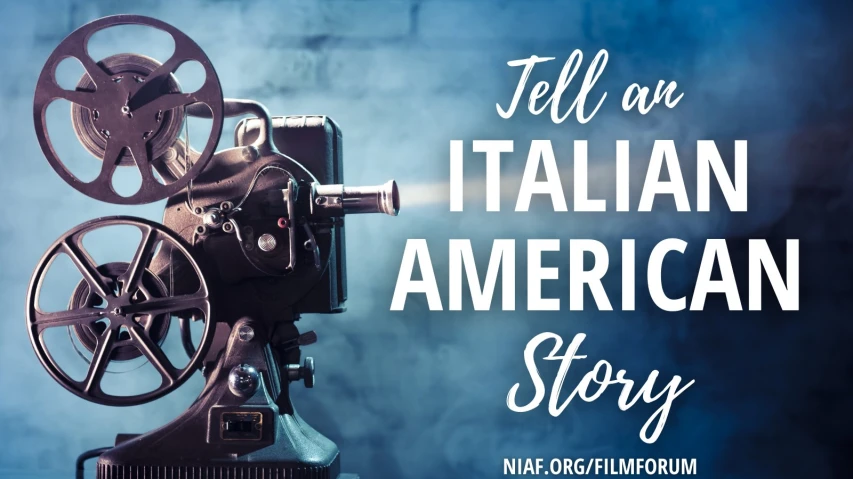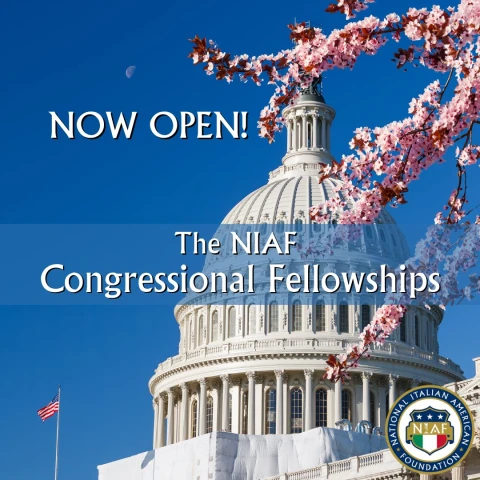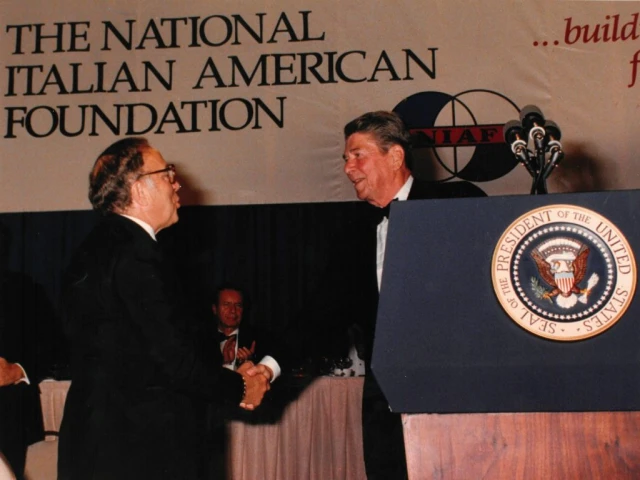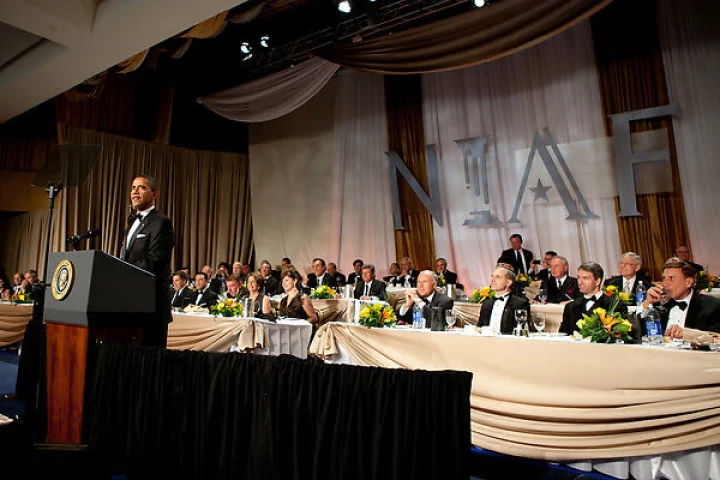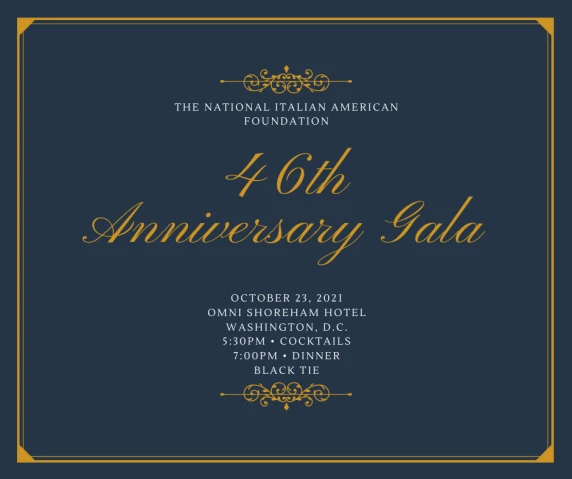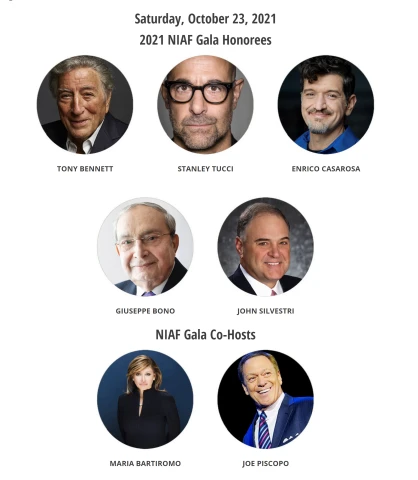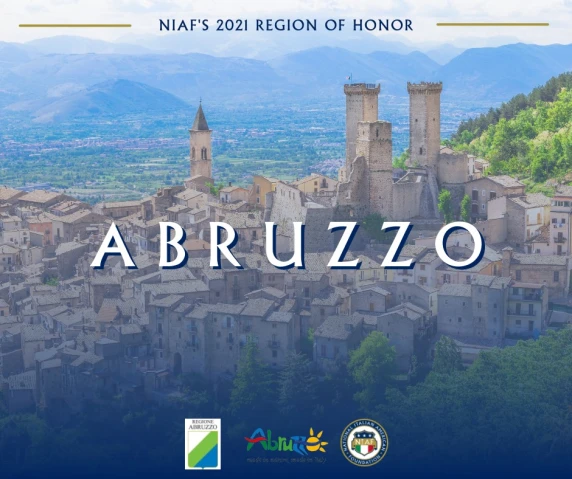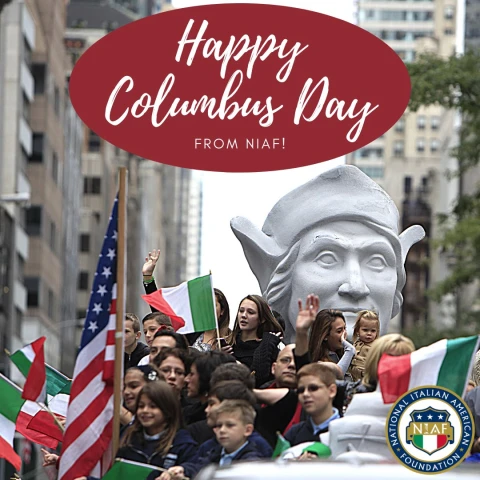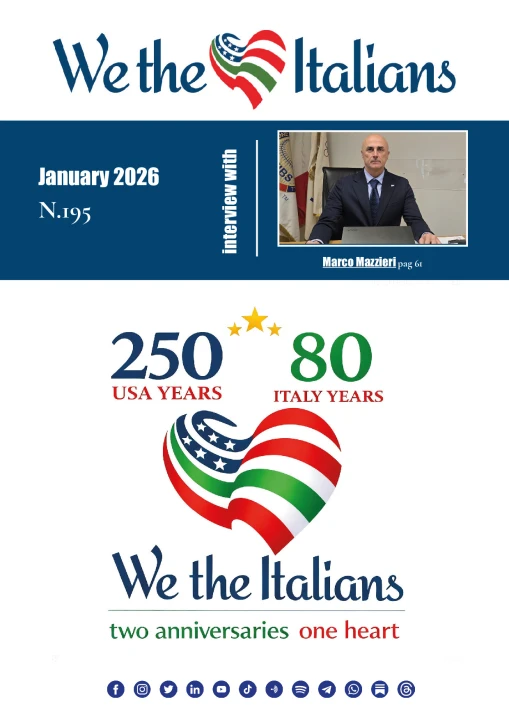It's not easy to take over the reins of NIAF at this time, with a pandemic that is still doing damage and casualties, and that has left major economic and social problems in the United States. Several programs of the National Italian American Foundation, as well as other national and local Italian American and non-Italian American organizations, have been cancelled in the last 18 months, and things are picking up, yes, but more slowly than hoped.
In spite of this, NIAF - which is without a doubt the most popular, well-known and representative institution of the wonderful Italian American community - has recently renewed its leadership: and once again, as it always does, it has chosen people of great experience, ability and passion for Italy. At We the Italians, we are particularly happy and honored to host the new President of NIAF, who is also a personal friend of mine for years, a great Italian American who is very proud of his roots: Robert Allegrini.
Dear Robert, I would start by asking you about your Italian origins: your roots are in northern Italy, right?
Yes, I am a representative of the 15% or so of Italian Americans with roots outside of the Mezzogiorno. But I frankly attach little importance to old North/South divides. For more than 150 years there has only been one Italy which must remain sacrosanct and supersede any regional loyalties. Part of the problem, as I see it, with Italians, and by extension Italian Americans, is that they still consider themselves Milanese or Napoletani, as examples, before they consider themselves Italian. This has a debilitating effect on national cohesion that serves no one well. People must think in terms of the greatness of Italy as a whole and not solely of their region of origin.
But to answer your question about my specific roots, I have a grandmother born in Piemonte from a family with branches in both Piemonte and Val D’Aosta, a grandfather from Tuscany and another from the Tuscany/Lazio border in the heart of ancient Etruria. My mother was born in Lucca, but her mother was born in Dayton, Nevada. I’m very proud of the Western U.S. roots of my family. My great grandparents were married in Virginia City, Nevada (now a famous ghost town) back in 1896. They were true American pioneers. Unfortunately, my great grandmother contracted typhoid and the doctors told her that her recovery would be aided by the climate back in Italy, so they returned there. The part of the family that remained in Nevada prospered. My cousin, Bill Raggio, was the longest serving State Senator in Nevada history and I am proud to say was honored with a NIAF Lifetime Achievement Award in 1999.
Your career as an Italian American involved in the representation and promotion of Italy in America is quite long, both locally and nationally. Please describe it for our readers
Some might say I was destined for this involvement because my mother worked at the Italian Consulate General in Chicago throughout the 1950s. Moreover, I have always had a passion for history and knowing the history of Italian contributions to the world, I have always been a proud Italian American. This pride helped shape my educational and career choices. I spent a summer during college at the Università per stranieri in Perugia, Umbria and then a year of graduate school at the Cesare Alfieri political science faculty of the University of Florence, Tuscany.
When I returned to Chicago, I wanted to do something Italian related, so I served for 3 years as the full time Executive Director of the Joint Civic Committee of Italian Americans which is the umbrella association comprised of more than 50 different Italian American organizations in the Chicago area.
I then spent the next 3 decades in hospitality public relations including 10 years as Vice President of Communication for Hilton in the Americas immediately before assuming my current role as President of NIAF. But throughout those 3 decades I always stayed involved and active in the Italian American Community. I served for 3 years as President of the Italian American Chamber of Commerce of the Midwest and founded the Chicago Chapter of the Academia Italiana della Cucina. I also served on the board of the Chicago-Milano Sister City Committee, the National Italian American Sports Hall of Fame, and the Italian American Human Relations Foundation of Chicago. I have been involved in NIAF since the late 1980s and have served as a NIAF Area Coordinator, Regional Vice President, Board Director and Board Officer before becoming the foundation’s President in May.
I see, you’ve been devoted to NIAF for a long time: what drives your commitment to the foundation?
Simply put, it’s because the mission of the foundation conforms to my world view. And that view, equally simply put, is that the world would be a better place if only it were a bit more Italian.
Now I know and I appreciate that every ethnic group has made very valuable contributions to America which is one of the reasons it is a truly unique and exceptional nation. But I can’t help but believe that we would all be living better if only we lived more as Italians. Surely we would all be eating better and drinking better. We would be more artistic and more musical lest we forget that Italian is the very language of music. We would be more stylish and more passionate lest we forget that Romeo, Casanova and Valentino were all Italian but the most important thing to my mind is that if we were more Italian we would have a greater sense of humanity.
This incredible sense of humanity that characterizes the Italians is to my mind at the core of our identity. When people think of Italy they often can’t get beyond the incredible food or the amazing architecture or the beautiful fashion. But as the great English writer E.M. Forster wrote long ago, “Don’t, I beg you, go with that awful tourist idea that Italy is only a museum of antiquities and art. Love and understand the Italians for the people are more marvelous than the land.”
Now when you take Forster’s advice and study the Italian people and their history you see a continuum of incomparable humanity. From the time of ancient Rome when Italy built an Empire based not on enslavement but on inclusion, through the Italian Renaissance which produced the greatest concentration of cultural achievement the world had ever known, to the darkest days of world war II when the Italian people and indeed the Italian army resorted to every possible means to protect both Italian Jews and the foreign Jews in its control from the Nazi’s you see a pattern of humanity and a culture that is tolerant, accepting and broadminded.
As the acclaimed Wall Street Journal writer Dorothy Rabiniwitz opined on this subject of the Italian role in the Holocaust, “What there was in the character of the Italians that made their resistance to mass murder so implacable is a question we may ponder and one for whose existence we may be grateful.”
Of course being fully human also means being flawed and Italy has had and continues to have its share of unique, flawed characters and even flawed national characteristics. But in their totality, the Italians are a magnificent people and I for one unabashedly long for the day when Italy regains its just and historic role as the dominant cultural, spiritual and economic force of the Mediterranean basin.
You are the new President of NIAF, but the entire top leadership of this wonderful foundation has been renewed. Please help us remember which other amazing people are on the new NIAF board
Unfortunately, you don’t have enough space for me to extol the virtues of the great Italian Americans who make up the current board of NIAF. But at least I can tell you about our top leaders. Our new Chairman Bob Carlucci is someone who reflects great luster on his Italian heritage. He is an extremely successful, self-made entrepreneur and philanthropist about whom whole chapters have been written in business related books. He is a native Bostonian, and I recently had the pleasure of spending a few days there with his family who are quintessentially Italian in their love for music, food, stories, and each other.
John Calvelli our new Executive Vice Chairman is someone who has devoted much of his life to advancing the interests of Italian Americans having been one of the founders of Fieri, the national Italian American young professionals networking group, at age 20. Today he remains involved in multiple Italian American organizations while at the same time serving as Executive Vice President of Public affairs for the Wildlife Conservation Society.
I'm going to ask you a difficult question, because the answer could be very long: for the few who don't know what NIAF is, can you briefly tell us its history and its activities up to now?
The National Italian American Foundation was born in 1975 to give a voice in the capital to the nation’s 20 million Italian Americans. The mission of NIAF is to preserve the Italian American heritage and culture, to promote and inspire a positive image of the legacy of Italian Americans and to empower ties between the United States and Italy.
It does this in a multitude of ways.
For example one of the foundation’s signature programs is the Voyage of Discovery which takes young Italian Americans on their first trip to Italy to experience the land of their forefathers. To date the foundation has taken almost a thousand young Italian Americans to Italy.
In the last decade alone NIAF has also provided 4.5 Million in direct aid to deserving Italian American students.
It provides funding for College level Italian clubs through its NIAF on Campus Initiative.
The Foundation’s Russo Brothers Film Forum provides funding for films that illuminate various aspects of the Italian American experience.
Grants are given each year for a variety of projects. Last year for example NIAF gave $50,000 toward the creation of the National Columbus Education Foundation which seeks to present a more accurate view of Columbus than the current skewed narrative.
NIAF provides programing both on line and in person on numerous topics of interest to Italian Americans ranging from how to gain Italian dual citizenship to buying a home in Italy to Italian genealogy and Italian food and wine.
We take an active stand in defending the Italian American community on matters of anti-defamation.
NIAF has a strong public affairs component. The foundation works closely with the federal government to ensure that Italian Americans are represented appropriately in the administration.
The foundation also works closely with the Italian American Congressional Delegation. For example last year when a U.S. Senator proposed replacing the Columbus Day holiday with Juneteenth Day NIAF successfully activated the delegation which was able to have the proposal rescinded.
NIAF also sponsors a number of events on Capitol Hill each year through the Frank J Guarini Public Policy Forum which brings leaders from government, business, and science to Capitol Hill to speak out on bipartisan global and national security issues of our times. It covers key issues involving our federal government and our challenges abroad in today’s changing world.
NIAF also sponsors a Congressional Fellowship Program which places outstanding Italian American college students and recent graduates in offices of members of the Italian American Congressional Delegation.
Of course our annual gala has historically been the venue where Presidents of the United States have come to honor the Italian American community and every President of the United States from Reagan through Obama has attended at least one NIAF gala.
NIAF Serves as a bridge to Italy. It aims to strengthen cultural and economic ties between Italy and the U.S. through work with business and political leaders of both countries. Each year NIAF selects one of the 20 regions of Italy to serve as its “Region of Honor” and plans a variety of initiatives together with the region including economic and cultural exchanges and a board of directors trip to the region.
NIAF also serves as a valuable partner to the Italian Embassy in Washington providing introductions and contacts to the embassy staff as well as to visiting Italian officials.
You mentioned the famous NIAF annual gala in Washington D.C. Can you tell us about this year’s gala?
Once again this year, we will be honoring an outstanding group of worthy Italians and Italian Americans at our gala in Washington D.C. on October 23rd. The region of honor is Abruzzo. Among our honorees will be legendary singer Tony Bennett, famed actor and presenter Stanley Tucci, Film Producer Enrico Casarosa, businessman John Silvestri and Fincanteri CEO Giuseppe Bono. This year because of the continuing travel restrictions on citizens of the Schengen Area we are planning a smaller, more intimate gala and out of necessity some of our honorees will be accepting their awards virtually. We are going to package an on-line version of the gala so that it can be viewed by all interested friends of NIAF around the world shortly after the in person gala. We would love to have the readers of We the Italians attend our gala in person but if they can’t we will be bringing the gala to them with our subsequent transmission.
What is the goal of your term as President? Is there anything new we should expect?
As President, I would like to build on our community’s Italian American identity by providing greater access to subject matter that conveys the full richness of our heritage.
Historically I don’t think we’ve done a great job as an ethnic group in teaching our children what it means to be of Italian descent beyond the kitchen and the church. By that I mean we have had too many nonne who have taught their children and grandchildren their recipes and their prayers but regrettably not much else about what it means to be of Italian descent. Consequently we have too many Italian Americans whose Italian identity is defined solely by cuisine and religion.
Now I certainly wouldn’t take anything away from the fundamental nature of either of those elements. Surely as Italian Americans we eat better than anyone on earth and it should be a point of pride that the mother church has been based in the heart of the Italian peninsula for nearly 2 millennia, but the Italian identity is so much richer than simply the kitchen and the church. We need to be teaching our children about the glory of Italian music and art, its science and architecture. We need to be teaching our children about the country’s history and its politics and most certainly the beautiful Italian language.
When we don’t teach our children these things then a pop culture which continues to be fixated on portraying Italian Americans as mobsters or buffoons fills the void which damaging consequences to Italian American self-perception and to the general American perception of Italian Americans.
So one of my principle missions is to build upon NIAF’s grant program and to support more worthy projects such as books, films, plays, websites, exhibits and apps which showcase diverse aspects of Italian and Italian American culture and history.
I won’t be content until all Italian Americans appreciate the full richness of their heritage and until the rest of the country recognizes us as the worthy heirs of a culture that is at the very core of Western Civilization.
Are there also plans to strengthen NIAF presence here in Italy? We the Italians believe that America needs more Italy, and that Italy needs more America, and it would be very important to have an Italian American representation here. Because you Italian Americans are 20 million testimonials of the absolute truth of both sides of our statement and here in Italy there is a great need to always remember that...
I agree completely with We the Italians view on the need for more America in Italy and more Italy in America. There is much we can teach each other. America can teach Italy about the importance of civics, of ecology, of philanthropy and of patriotism all of which, to my mind, still lag in Italy. Meanwhile, Italy can teach America the importance of family, beauty, passion, and culture. It is precisely because Italian Americans embody many of the best qualities and values of both cultures that I believe they are a profound force for good and that they should be valued and utilized by both countries. I have already been to Italy as the President of NIAF and have spoken in person and on Italian television about the importance of NIAF and the need for Italians to support it and I shall continue to do so. We also have our own affiliate organization in Italy called NIAF Italia which helps to promote the recognition of NIAF in Italy.
The last question is about the attacks on Columbus. Unfortunately, it seems to me that these attacks now go beyond the injustices dedicated to a great Italian of the past and have become a way of ignoring the rights of Italian Americans and even a fundamental tool in the war on logic and truth that is summarized under the name of cancel culture. What are your thoughts on this matter?
I perceive the ongoing attacks on Columbus to be animated not so much by inherent anti-Italianism as by a profound hatred of the Western culture and civilization which Columbus represents. If Columbus were Irish or Polish, for example, I think he would still be villainized by a segment of the population who are sadly ignorant of the actual history of the man and who are willing to buy into a false narrative intent upon blaming Western civilization for all the worlds ills.
The situation takes on an anti-Italian character only when it becomes apparent that large swaths of American society refuse to respect the legitimate desire of the Italian American community to retain Columbus as a symbol of their struggles and ultimate triumphs as Americans. In an age of acute ethnic and racial sensitivity, Italian Americans are not receiving the consideration they deserve on this issue and NIAF is working extremely hard to change this fact. In this effort, as well as all others, I know we can count on the support of We the Italians and as a representative of the Italian American community I wish to extend our sincere thanks to this invaluable publication.
Non è facile prendere in mano le redini della NIAF in questo momento, con una pandemia che ancora fa danni e vittime, e che ha lasciato grandi problemi a livello economico e sociale, negli Stati Uniti. Diversi programmi della National Italian American Foundation, come di altre organizzazioni nazionali e locali italoamericane e non, sono stati cancellati negli ultimi 18 mesi, e le cose stanno ripartendo, si, ma più lentamente di quanto si sperasse.
Nonostante ciò, la NIAF – che è senza dubbio l’istituzione italoamericana più popolare, conosciuta e rappresentativa della meravigliosa comunità italoamericana – ha da poco rinnovato i suoi vertici: e ancora una volta, come sempre fa, ha scelto persone di grande esperienza, capacità e passione per l’Italia. Noi di We the Italians siamo particolarmente felici e onorati di ospitare il nuovo Presidente della NIAF, che è anche un mio amico personale da anni, un grande italoamericano davvero molto orgoglioso delle sue radici: Robert Allegrini.
Caro Robert, comincerei col chiederti delle tue origini italiane: le tue radici sono nel nord Italia, giusto?
Sì, sono un rappresentante di quel 15% circa di italoamericani con radici al di fuori del Mezzogiorno. Ma francamente do poca importanza alle vecchie divisioni Nord/Sud. Per più di 150 anni c'è stata una sola Italia che deve rimanere unita e sostituire qualsiasi lealtà regionale. Parte del problema, per come la vedo io, con gli italiani, e per estensione gli italoamericani, è che si considerano ancora milanesi o napoletani, per fare un esempio, prima di considerarsi italiani. Questo ha un effetto debilitante sulla coesione nazionale che non serve a nessuno. Le persone devono pensare in termini di grandezza dell'Italia nel suo insieme e non solo della loro regione d'origine.
Ma per rispondere alla tua domanda sulle mie radici specifiche, ho una nonna nata in Piemonte da una famiglia con origini sia in Piemonte che in Val D'Aosta, un nonno dalla Toscana e un altro dal confine Toscana/Lazio nel cuore dell'antica Etruria. Mia madre è nata a Lucca, ma sua madre è nata a Dayton, Nevada.
Sono molto orgoglioso delle radici americane occidentali della mia famiglia. I miei bisnonni si sposarono a Virginia City, Nevada (ora una famosa città fantasma) nel 1896. Erano veri pionieri americani. Purtroppo la mia bisnonna contrasse il tifo e i medici le dissero che la sua guarigione sarebbe stata favorita dal clima dell'Italia, così tornarono lì. La parte della famiglia che rimase in Nevada prosperò. Mio cugino, Bill Raggio, è stato il Senatore di Stato più a lungo in servizio nella storia del Nevada e sono orgoglioso di dire che è stato onorato con un premio NIAF alla carriera nel 1999.
La tua carriera di italoamericano coinvolto nella rappresentazione e promozione dell'Italia in America è piuttosto lunga, sia a livello locale che nazionale. Ti prego di descriverla per i nostri lettori
Qualcuno potrebbe dire che era nel mio destino, perché mia madre ha lavorato al Consolato Generale d'Italia a Chicago negli anni '50. Inoltre, ho sempre avuto una passione per la storia e conoscendo la grandezza dei contributi italiani alla storia mondiale, sono sempre stato orgoglioso di essere italoamericano. Questo orgoglio ha contribuito a plasmare le mie scelte educative e di carriera. Ho trascorso un'estate durante il college all'Università per stranieri di Perugia, in Umbria, e poi un anno di scuola di specializzazione alla facoltà di scienze politiche Cesare Alfieri dell'Università di Firenze, in Toscana.
Quando sono tornato a Chicago, volevo fare qualcosa di italiano, così ho lavorato per 3 anni come direttore esecutivo a tempo pieno del Joint Civic Committee of Italian Americans, che è l'associazione che riunisce più di 50 diverse organizzazioni italoamericane nell'area di Chicago.
Ho poi trascorso i successivi 3 decenni nelle relazioni pubbliche nel campo dell'ospitalità, compresi 10 anni come vicepresidente della comunicazione per Hilton nelle Americhe, immediatamente prima di assumere il mio attuale ruolo di presidente della NIAF. Ma durante questi 3 decenni sono sempre rimasto coinvolto e attivo nella comunità italoamericana. Per 3 anni sono stato Presidente della Camera di Commercio ItaloAmericana del Midwest e ho fondato il capitolo di Chicago dell'Academia Italiana della Cucina. Ho anche fatto parte del comitato che si è occupato del gemellaggio tra Chicago e Milano, del National Italian American Sports Hall of Fame e dell'Italian American Human Relations Foundation di Chicago. Sono stato coinvolto nella NIAF dalla fine degli anni '80 e ho servito come coordinatore di area NIAF, vicepresidente regionale, direttore del consiglio e funzionario del consiglio prima di diventare Presidente della fondazione in maggio.
Ti dedichi alla NIAF da molto tempo: cosa spinge il tuo impegno verso la fondazione?
In parole povere, è perché la missione della fondazione è conforme alla mia visione del mondo. E questa visione, altrettanto semplicemente, è che il mondo sarebbe un posto migliore se solo fosse un po' più italiano.
Ora, io apprezzo ogni gruppo etnico e so che ognuno ha dato contributi molto preziosi all'America: è una delle ragioni per cui è una nazione davvero unica ed eccezionale. Ma non posso fare a meno di credere che vivremmo tutti meglio se solo vivessimo di più come italiani. Sicuramente mangeremmo tutti meglio e berremmo meglio. Saremmo più artistici e più musicali, non dimentichiamo che l'italiano è la lingua stessa della musica. Saremmo più eleganti e più appassionati: Romeo, Casanova e Valentino erano tutti italiani. Ma la cosa più importante per me è che se fossimo più italiani avremmo un maggiore senso di umanità.
Questo incredibile senso di umanità che caratterizza gli italiani è secondo me il cuore della nostra identità. Quando la gente pensa all'Italia spesso non riesce ad andare oltre l'incredibile cibo o la magnifica architettura o la bellissima moda. Ma come scrisse tempo fa il grande scrittore inglese E.M. Forster, "Non andate, vi prego, con quell'orribile idea turistica che l'Italia sia solo un museo di antichità e arte. Amate e capite gli italiani perché il popolo è più meraviglioso della terra".
Ora, quando si segue il consiglio di Forster e si studia il popolo italiano e la sua storia, si vede un continuum di incomparabile umanità. Dai tempi dell'antica Roma, quando l'Italia costruì un impero basato non sulla schiavitù ma sull'inclusione, attraverso il Rinascimento italiano che produsse la più grande concentrazione di risultati culturali che il mondo abbia mai conosciuto, fino ai giorni più bui della seconda guerra mondiale, quando il popolo italiano e l'esercito italiano ricorsero ad ogni mezzo possibile per proteggere dai nazisti sia gli ebrei italiani che gli ebrei stranieri sotto il suo controllo, si vede un modello di umanità e una cultura che è tollerante, accettante e di ampie vedute.
Come l'acclamata scrittrice del Wall Street Journal Dorothy Rabiniwitz ha scritto su questo argomento del ruolo italiano nell'Olocausto, "Cosa ci fosse nel carattere degli italiani che rendeva la loro resistenza all'omicidio di massa così implacabile è una domanda su cui possiamo riflettere e per la cui esistenza possiamo essere grati".
Naturalmente essere pienamente umani significa anche essere imperfetti e l'Italia ha avuto e continua ad avere la sua parte di personaggi unici, imperfetti e anche caratteristiche nazionali imperfette. Ma nella loro totalità, gli italiani sono un popolo magnifico e io aspetto ardentemente il giorno in cui l'Italia riconquisterà il suo giusto e storico ruolo di forza culturale, spirituale ed economica dominante nel bacino del Mediterraneo.
Se il nuovo Presidente della NIAF, ma l'intero vertice di questa meravigliosa fondazione è stato rinnovato. Per favore, aiutaci a ricordare quali altre persone straordinarie fanno parte del nuovo board della NIAF
Purtroppo non c'è abbastanza spazio per me per esaltare le virtù dei grandi italoamericani che compongono l'attuale consiglio della NIAF. Ma almeno posso parlarvi dei nostri massimi dirigenti. Il nostro nuovo Chairman Bob Carlucci dà grande lustro alla sua origine italiana. È un imprenditore e filantropo di grande successo, che si è fatto da solo, sul quale sono stati scritti interi capitoli nei libri di economia. È originario di Boston e recentemente ho avuto il piacere di passare alcuni giorni con la sua famiglia, che è la quintessenza dell'amore italiano per la musica, il cibo, le storie e gli uni per gli altri.
John Calvelli, il nostro nuovo Vice Presidente Esecutivo, è una persona che ha dedicato gran parte della sua vita a promuovere gli interessi degli italoamericani, essendo stato uno dei fondatori di Fieri, il gruppo nazionale di giovani professionisti italoamericani, all'età di 20 anni. Oggi rimane coinvolto in molteplici organizzazioni italoamericane mentre allo stesso tempo ricopre il ruolo di vicepresidente esecutivo degli affari pubblici per la Wildlife Conservation Society.
Ti farò una domanda difficile, perché la risposta potrebbe essere molto lunga: per i pochi che non sanno cos'è la NIAF, puoi raccontarci brevemente la sua storia e le sue attività fino ad oggi?
La National Italian American Foundation è nata nel 1975 per dare una voce nella capitale ai 20 milioni di italoamericani della nazione. La missione della NIAF è di preservare l'eredità e la cultura italoamericana, di promuovere e ispirare un'immagine positiva dell'eredità degli italoamericani e di rafforzare i legami tra gli Stati Uniti e l'Italia.
Lo fa in molti modi.
Per esempio, uno dei programmi di punta della fondazione è il Voyage of Discovery che porta i giovani italoamericani nel loro primo viaggio in Italia per visitare la terra dei loro antenati. Ad oggi la fondazione ha portato quasi mille giovani italoamericani in Italia.
Solo nell'ultimo decennio la NIAF ha anche donato 4,5 milioni in aiuti diretti a studenti italoamericani meritevoli.
Fornisce finanziamenti per club italiani a livello universitario attraverso la sua iniziativa NIAF on Campus.
Il Russo Brothers Film Forum della Fondazione prevede finanziamenti per film che raccontano vari aspetti dell'esperienza italoamericana.
Le sovvenzioni sono date ogni anno per diversi progetti. L'anno scorso, per esempio, la NIAF ha dato 50.000 dollari per la creazione della National Columbus Education Foundation, che cerca di presentare una visione più accurata di Colombo rispetto all'attuale narrazione distorta.
La NIAF produce programmi sia on line che di persona su numerosi argomenti di interesse per gli italoamericani che vanno da come ottenere la doppia cittadinanza italiana all'acquisto di una casa in Italia alla genealogia italiana e all'enogastronomia italiana.
Prendiamo una posizione attiva nella difesa della comunità italoamericana su questioni di lotta alla diffamazione.
La NIAF ha una forte componente di affari pubblici. La fondazione lavora a stretto contatto con il governo federale per assicurare che gli italoamericani siano rappresentati adeguatamente nell'amministrazione.
La fondazione lavora anche a stretto contatto con la delegazione italoamericana al Congresso. Per esempio, l'anno scorso, quando un senatore americano ha proposto di sostituire la festa del Columbus Day con il Juneteenth Day, la NIAF ha attivato con successo la delegazione che è riuscita a far annullare la proposta.
La NIAF sponsorizza anche una serie di eventi a Capitol Hill ogni anno attraverso il Frank J Guarini Public Policy Forum che porta i leader del governo, degli affari e della scienza a Capitol Hill per parlare di questioni bipartisan di sicurezza globale e nazionale dei nostri tempi. Copre questioni chiave che coinvolgono il nostro governo federale e le nostre sfide all'estero nel mondo di oggi che cambia.
La NIAF sponsorizza anche il Congressional Fellowship Program che colloca eccezionali studenti universitari italoamericani e neolaureati negli uffici dei membri della delegazione italoamericana al Congresso.
Naturalmente il nostro gala annuale è storicamente il luogo in cui i Presidenti degli Stati Uniti sono venuti ad onorare la comunità italoamericana e ogni Presidente degli Stati Uniti da Reagan a Obama ha partecipato ad almeno un gala della NIAF.
La NIAF serve come un ponte verso l'Italia. Mira a rafforzare i legami culturali ed economici tra l'Italia e gli Stati Uniti attraverso il lavoro con i leader economici e politici di entrambi i paesi. Ogni anno la NIAF seleziona una delle 20 regioni d'Italia come sua "Regione d'Onore" e pianifica una serie di iniziative insieme alla regione, inclusi scambi economici e culturali e un viaggio del board nella regione.
La NIAF è anche un partner prezioso per l'ambasciata italiana a Washington, fornendo presentazioni e contatti al personale dell'ambasciata e ai funzionari italiani in visita.
Hai menzionato il famoso gala annuale della NIAF a Washington D.C. Puoi parlarci del gala di quest'anno?
Anche quest'anno, onoreremo un gruppo eccezionale di italiani e italoamericani meritevoli al nostro gala a Washington D.C. il 23 ottobre. La regione d’onore è l’Abruzzo. Tra i nostri premiati ci saranno il leggendario cantante Tony Bennett, il famoso attore e presentatore Stanley Tucci, il produttore cinematografico Enrico Casarosa, l'uomo d'affari John Silvestri e il CEO di Fincanteri Giuseppe Bono. Quest'anno, a causa delle continue restrizioni di viaggio per i cittadini dell'area Schengen, stiamo progettando un gala più piccolo e intimo e, per necessità, alcuni dei nostri premiati ritireranno i loro premi virtualmente. Abbiamo intenzione di confezionare una versione on-line del gala in modo che possa essere vista da tutti gli amici interessati della NIAF in tutto il mondo poco dopo il gala in persona. Ci piacerebbe che i lettori di We the Italians partecipassero di persona al nostro gala, ma se non possono, porteremo il gala da loro con la nostra successiva trasmissione.
Qual è l'obiettivo del tuo mandato come Presidente? C'è qualcosa di nuovo che dobbiamo aspettarci?
Come Presidente, vorrei costruire sull'identità italoamericana della nostra comunità, fornendo un maggiore accesso ad argomenti che trasmettano la piena ricchezza del nostro patrimonio culturale.
Storicamente non credo che abbiamo fatto un gran lavoro come gruppo etnico nell'insegnare ai nostri figli cosa significa essere di origine italiana al di là della cucina e della chiesa. Con questo voglio dire che abbiamo avuto troppe nonne che hanno insegnato ai loro figli e nipoti le loro ricette e le loro preghiere, ma purtroppo non molto altro su ciò che significa essere di origine italiana. Di conseguenza abbiamo troppi italoamericani la cui identità italiana è definita unicamente dalla cucina e dalla religione.
Ora, certamente non toglierei nulla alla natura fondamentale di nessuno di questi elementi. Sicuramente come italoamericani mangiamo meglio di chiunque altro sulla terra e dovrebbe essere un punto d'orgoglio che la chiesa madre abbia avuto sede nel cuore della penisola italiana per quasi 2 millenni, ma l'identità italiana è molto più ricca della semplice cucina e della chiesa. Dobbiamo insegnare ai nostri figli la gloria della musica e dell'arte italiana, la scienza e l'architettura. Dobbiamo insegnare ai nostri figli la storia del paese, la sua politica e soprattutto la bellissima lingua italiana.
Quando non insegniamo queste cose ai nostri figli, allora una cultura pop che continua ad essere fissata nel ritrarre gli italoamericani come mafiosi o buffoni riempie il vuoto, con conseguenze dannose per l'auto percezione italoamericana e per la percezione generale americana degli italoamericani.
Quindi una delle mie principali missioni è quella di costruire sul programma di sovvenzioni della NIAF e di sostenere progetti più meritevoli come libri, film, opere teatrali, siti web, mostre e applicazioni che mostrano diversi aspetti della cultura e della storia italiana e italoamericana.
Non sarò contento finché tutti gli italoamericani non apprezzeranno la piena ricchezza del loro patrimonio culturale e finché il resto del Paese non ci riconoscerà come degni eredi di una cultura che è al centro della civiltà occidentale.
Ci sono anche piani per rafforzare la presenza della NIAF qui in Italia? We the Italians ritiene che l'America abbia bisogno di più Italia, e che l'Italia abbia bisogno di più America, e sarebbe molto importante avere una rappresentanza italoamericana qui. Perché voi italoamericani siete 20 milioni di testimonial della verità assoluta di entrambi i lati della nostra dichiarazione e qui in Italia c'è un grande bisogno di ricordarlo sempre...
Sono completamente d'accordo con We the Italians sulla necessità di più America in Italia e più Italia in America. C'è molto che possiamo insegnarci a vicenda. L'America può insegnare all'Italia l'importanza dell'educazione civica, dell'ecologia, della filantropia e del patriottismo, tutte cose che, secondo me, sono ancora in ritardo in Italia. Nel frattempo, l'Italia può insegnare all'America l'importanza della famiglia, della bellezza, della passione e della cultura. Proprio perché gli italoamericani incarnano molte delle migliori qualità e valori di entrambe le culture, credo che siano una profonda forza per il bene e che dovrebbero essere valorizzati e utilizzati da entrambi i Paesi. Sono già stato in Italia come presidente della NIAF e ho parlato di persona e alla televisione italiana dell'importanza della NIAF e della necessità che gli italiani la sostengano e continuerò a farlo. Abbiamo anche la nostra organizzazione affiliata in Italia chiamata NIAF Italia che aiuta a promuovere il riconoscimento della NIAF in Italia.
L'ultima domanda riguarda gli attacchi a Colombo. Purtroppo mi sembra che questi attacchi vadano ormai oltre le ingiustizie dedicate a un grande italiano del passato e siano diventati un modo per ignorare i diritti degli italoamericani e addirittura uno strumento fondamentale nella guerra alla logica e alla verità che si riassume sotto il nome di cancel culture. Qual è il tuo pensiero su questa vicenda?
Percepisco che i continui attacchi a Colombo sono animati non tanto da un intrinseco anti-italianismo quanto da un profondo odio per la cultura e la civiltà occidentale che Colombo rappresenta. Se Colombo fosse irlandese o polacco, per esempio, penso che sarebbe comunque screditato da una parte della popolazione che è tristemente ignorante della storia reale dell'uomo e che è disposta a credere ad una falsa narrazione intenta ad incolpare la civiltà occidentale per tutti i mali del mondo.
La situazione assume un carattere anti-italiano solo quando diventa evidente che ampie fasce della società americana rifiutano di rispettare il legittimo desiderio della comunità italoamericana di mantenere Colombo come simbolo delle loro lotte e dei loro successi come americani. In un'epoca di acuta sensibilità etnica e razziale, gli italoamericani non stanno ricevendo la considerazione che meritano su questo tema e la NIAF sta lavorando duramente per cambiare questo fatto. In questo sforzo, così come in tutti gli altri, so che possiamo contare sul sostegno di We the Italians e come rappresentante della comunità italoamericana desidero estendere i nostri sinceri ringraziamenti a questa preziosa squadra.


